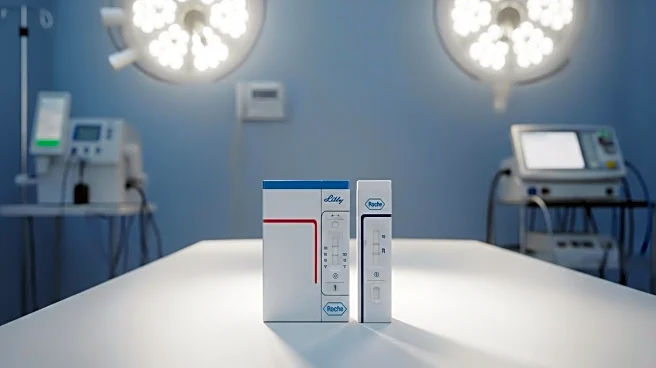What's Happening?
The FDA has approved Roche and Eli Lilly's Elecsys pTau181 blood test for use in primary care settings to aid in the initial assessment of cognitive decline related to Alzheimer's disease. The test is designed for patients aged 55 and older, measuring levels of phosphorylated Tau protein to help rule out Alzheimer's pathology. This approval marks a significant step in making Alzheimer's diagnostics more accessible, allowing primary care providers to identify potential cases earlier and refer patients for advanced evaluation and treatment.
Why It's Important?
The approval of Elecsys pTau181 represents a major advancement in Alzheimer's diagnostics, potentially increasing the uptake of existing therapies by identifying suitable candidates for treatment. This could address current market challenges faced by Alzheimer's drugs, which have struggled to gain traction. By facilitating earlier detection, the test could improve patient outcomes and streamline the diagnostic process, reducing bottlenecks in the healthcare system. The collaboration between Roche and Lilly highlights the importance of partnerships in driving innovation in medical diagnostics.
What's Next?
With the FDA approval, Roche and Lilly are expected to expand the availability of Elecsys pTau181, potentially increasing its adoption in primary care settings. The companies may also pursue further research and development to enhance the test's capabilities and explore additional biomarkers. This could lead to more comprehensive diagnostic tools for Alzheimer's and related neurodegenerative diseases. The approval may also prompt other companies to develop similar tests, increasing competition and innovation in the field.
Beyond the Headlines
The introduction of blood-based diagnostics for Alzheimer's reflects a broader trend towards non-invasive testing methods, which could revolutionize the approach to diagnosing and managing neurodegenerative diseases. This shift could lead to more personalized and timely interventions, improving patient care and reducing healthcare costs. Additionally, the focus on primary care settings emphasizes the need for accessible diagnostics, which could democratize healthcare and ensure that more patients receive timely and accurate assessments.










